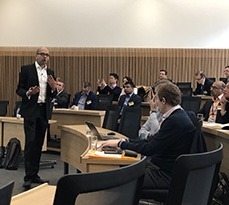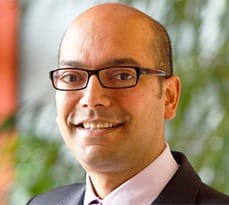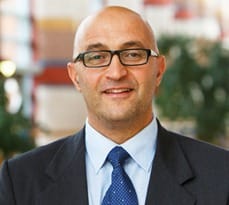
The second edition of the InnoFrugal UK conference was held on 19 March at Cambridge Judge Business School, bringing together academics, managers and entrepreneurs to discuss ways to advance the circular economy and concepts of frugal innovation.
The conference, which followed on from the inaugural event last year, was co-hosted by the Nordic Frugal Innovation Society (TNFIS) and frugal innovation-focused digital applications company Ignitho Technologies.
“Sustainability is a big trend in companies now,” said conference speaker Timo Boldt, founder and CEO of recipe-box company Gousto and an alumnus of the Executive MBA programme at Cambridge Judge. “We are trying to reduce the use of plastic, for example, we would not package a single courgette in plastic. We took 50 per cent of plastic from our packaging already and we’re looking at other ways to reduce more.”
Joseph Olassa, CEO of Ignitho, said “Frugal innovation is real and it’s already happening around us, everywhere.”
Venkata Gandikota, Founder of the Nordic Frugal Innovation Society, said that financing is a “major issue” that holds back frugal innovators, so impact investing is an important element in unlocking the full potential of frugal innovation.
We asked two faculty members at Cambridge Judge, Professor Jaideep Prabhu and Dr Khaled Soufani, to reflect on the InnoFrugal UK conference – how society has so far embraced circular economy and frugal innovation principles, and what sort of work remains to be done.
Jaideep Prabhu, Professor of Marketing at Cambridge Judge Business School and co-author of the book Jugaad Innovation (about developing countries) and Frugal Innovation (about the West):

“Frugal innovation – the creation of faster, better and cheaper solutions that employ minimal resources – is now a global phenomenon. Once the preserve of the developing world, the West is now also catching up. For one thing, Western consumers are now not only value conscious, they also care about the environment and social problems such as poverty and inequality. Moreover, thanks to ubiquitous resources like smartphones, cloud computing, 3D printers, crowdfunding, and social media, small teams of Western entrepreneurs are now able to do with limited resources what only large firms or the government could do in the past.
“This is particularly true in the context of the circular economy and the internet of things. The old, 20th century linear economic model of ‘take, make and dispose’ is increasingly being replaced by circular models of ‘reduce, replace and recycle’. Smart solutions that employ data and networks of sensors and devices connected to smartphones are being developed to help all actors in the value chain – producers and consumers alike – move to such a circular approach. Areas in which frugal, smart solutions that combine cheap sensors, smartphones and data include precision farming, better energy use in homes and offices, and recycling and reduction of food waste.
“The second edition of InnoFrugal UK demonstrated the determination to drive global growth by employing more people creatively, while at the same time helping to solve some of the big problems of poverty, climate change and inequality. Great strides have been made in the past decade, but there is still a long way to go.”
Dr Khaled Soufani, Faculty (Professor level) in Management Practice and Director of the Circular Economy Centre at Cambridge Judge Business School:

“The more research we do on the circular economy, the more we realise how little we know – but we certainly know that the potential is significant and could have global impact. The landscape of the circular economy is changing, and research now estimates that the circular economy will likely be worth $4.5 trillion in the next 15 years. The European Union has been incorporating circular economy policy for many years, and there is 5.5 billion euros pledged in the European structural and investment funds for waste management alone. The UK government is also aware of the benefits of transitioning to a circular economy model, as are many enterprises of all sizes in a wide range of sectors and industries.
“So far, so good – but what progress to we need to make in the next decade?
“We need to continue to raise awareness of this new model, one that stimulates growth and competitiveness while also diminishing our reliance on the earth’s finite resources.
“This can be done in a number of ways, including through academic research, events such as InnoFrugal UK, and research initiatives such as the recently announced Creative Circular Economy Approaches to Eliminate Plastics Waste projects (of which the CEC at Cambridge Judge is a part).
“On the research front, we need to better connect studies that are now scattered, and initiate a more comprehensive research agenda that covers macroeconomics, microeconomics including how the circular economy impacts consumers, and regulation. As academics, we can also play our part to help enhance education about the circular economy throughout the university sector – including business schools and departments focusing on engineering, economics and industrial design.
“As reflected in its very name, there is no beginning and end to progress toward a circular economy. But as the world’s resources continue to dwindle, the need to reduce, remake and recycle will grow more acute over the next decade and beyond – so there is so there is no time to waste in reducing waste and finding new uses for unwanted old items.”
InnoFrugal UK Conference vox pops
Marisa Brennan: Marketing Manager at Charpak
Marisa on Charpak and its circular economy business model, recent developments at Charpak in terms of circular economy, and finally her thoughts on the conference.
Francesca Brkic: CISL
Francesca Brkic, CISL, gives her reaction to the conference.
Chris Aristidou: Operations Manager at Cablenet Communication Systems
Chris on his reaction to the conference and applying circular economy in practice.
Ken Banks: Head of Social Impact at Yoti
Ken discusses his background, his company Yoti and how it uses frugal innovation in practice, as well as his reaction to the conference.
David Chadwick: CEO of Carradice and founder of UPSO bags
David talks about how he became ‘an accidental frugal innovator’, and how his company employs circular economy principles to their business model.


